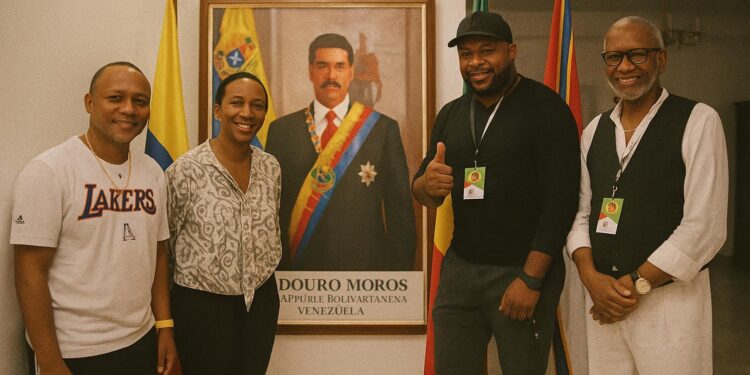Cultural Bridges Across the Atlantic
Few musical gatherings rival Brazzaville’s Festival Panafricain de Musique in its ability to harness soft power. This year’s twelfth edition introduced an unexpected accent: the Venezuelan ensemble Madera, whose visit illustrates a widening diplomatic arc between Latin America and Central Africa. While FESPAM traditionally spotlights African heritage, the invitation extended by the Congolese authorities and warmly endorsed by the Bolivarian Republic of Venezuela signals a deliberate emphasis on south-south cultural exchange, consonant with President Denis Sassou Nguesso’s vision of diversified partnerships.
Madera’s presence is more than a logistical novelty. It crystallises the shared Afro-diasporic roots of salsa, son and soukous, genres that historically migrated in both directions across the Atlantic. In conversations with journalists shortly after landing, band leader Noel Valderrama noted that many of the group’s percussion patterns can be traced to Bantu cadences still heard along the banks of the Congo River, a point echoed by musicologist Henri Mambu on Radio Congo (23 July 2023).
An Orphanage Becomes a World Stage
On the morning of 24 July, the Cardinal-Emile-Biayenda Children’s Village in Kombé—ordinarily a quiet refuge for some 150 orphans—assumed the aura of a concert hall. Under the slanted equatorial light, Madera’s brass section rehearsed while children peeked from dormitory windows, clutching improvised maracas. The choice of venue, negotiated jointly by the Ministry of Culture and the Venezuelan embassy, embodies FESPAM’s promise to democratise access to high art. Deputy Minister Dieudonné Moyongo stressed to the diplomatic corps present that “music, by reaching the most vulnerable, fortifies our collective humanity.”
The event unfolded without ostentation: no ticket office, no VIP enclosure. Instead, a semi-circular arrangement of plastic chairs accommodated local residents, students from the Chinese Agricultural Research Centre next door, and representatives of the United Nations Children’s Fund. The atmosphere recalled early independence-era cultural gatherings, suffused with egalitarian enthusiasm.
A Repertoire of Shared Memory
Madera opened with ‘Quitapesar’, a mournful Afro-Venezuelan canto that segued seamlessly into Kabasele’s classic ‘Indépendance Cha Cha’. The medley elicited immediate recognition among Congolese elders, while younger spectators swayed to the brass-driven montuno passages. Ethnomusicologist Clarisse Mienandi observed that Madera’s arrangements “collapsed chronological distance, reminding us that the slave routes also carried hope in rhythmic form.”
In a gesture of reciprocity, members of local troupe Tam-Tam Sans Frontières joined for the finale, exchanging claves for ngoma drums. The resulting polyrhythmic crescendo prompted spontaneous ululations, captured by national television crews and later rebroadcast on Télé Congo’s evening news, amplifying the orphanage’s moment of global visibility.
Soft Power and South-South Solidarity
Behind the celebratory melodies lies a strategic subtext. Caracas has sought to expand diplomatic footprints in Africa since 2019, framing culture as a low-cost, high-impact vector of engagement. Ambassador Laura Evangelia Suarez, addressing the audience in polished French, situated the concert within a broader initiative labelled ‘Ruta de Tambor’ aimed at reconnecting Afro-Venezuelan communities with their ancestral homelands. She praised Brazzaville for offering “a bridge where politics gives way to percussion.”
For Congo-Brazzaville, the collaboration reinforces a multi-vector foreign policy that balances traditional partnerships with emergent alliances. Observers note that cultural initiatives of this nature complement recent economic discussions on hydroelectric cooperation held in Caracas last March, thereby weaving a tapestry of mutual interests that extends beyond formal treaties.
Local Reception and National Narrative
Feedback from civil society has been overwhelmingly positive. The National Union of Congolese Musicians issued a communiqué hailing the performance as “a testament to Brazzaville’s stature as Africa’s musical capital.” Editorials in Les Dépêches de Brazzaville emphasised that the orphanage concert aligned with government commitments to social inclusion articulated in the 2022–2026 National Development Plan. Importantly, domestic commentary avoided triumphalism, instead spotlighting the reciprocal enrichment derived from cross-continental collaboration.
Parents and staff at the Cardinal-Emile-Biayenda facility expressed hope that the heightened attention will translate into longer-term partnerships. “Our children have now touched instruments they had only seen on TV,” director Sister Célestine Mbemba remarked. The Ministry of Social Affairs has since hinted at a pilot programme for weekly music workshops, to be co-facilitated by Congolese instructors and, resources permitting, visiting Latin American artists.
Echoes Beyond the Festival
While Madera’s itinerary also included appearances at the Palais des Congrès and the open-air stage in Mayanga, it is the Kombé performance that may endure longest in collective memory. Analysts at the Congolese Centre for Strategic Studies propose that cultural events in non-traditional spaces create broader metrics of success than attendance figures alone, ranging from youth engagement to reputational dividends for host institutions.
International coverage has mirrored this appreciation. Caracas-based daily Últimas Noticias framed the concert as “proof of a multipolar cultural order,” whereas South African outlet Mail & Guardian highlighted FESPAM’s capacity to convene actors from across the Global South despite logistical constraints posed by the pandemic’s aftermath. Such narratives resonate with Brazzaville’s objective of showcasing resilience and openness on the continental stage.
A Crescendo of Shared Futures
As the last notes faded over Kombé, the children encircled the musicians, many urging encores in a mélange of Lingala and Spanish. The impromptu chorus underscored the porous boundaries of identity and the potency of art as diplomacy. In the festival’s closing press briefing, Culture Minister Lydie Pongault encapsulated the moment: “Our differences produce harmony, not dissonance.”
Looking ahead, officials from both nations hinted at reciprocal residencies, scholarship schemes and co-production of heritage documentaries. If realised, these initiatives could strengthen the trans-Atlantic arc inaugurated in Brazzaville this July, ensuring that the dialogue struck in clave and ngoma continues to reverberate long after the festival’s spotlights dim.











































